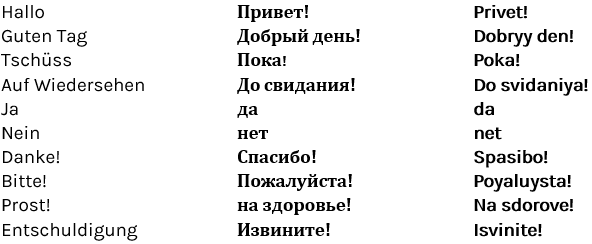Interesting facts about the language
Russian is a Slavic language and is most closely related to Ukrainian and Belarusian, with which it forms the group of East Slavic languages. Russian is by far the most widely spoken of all the Slavic languages: more than 160 million people speak it as their native language. Almost 70 million people also speak it as a second language, meaning they also use Russian in everyday life but speak a different native language. Besides the Russian Federation, most Russian-speaking people live in the other countries of the former Soviet Union, primarily in Ukraine (with around eleven million native speakers), Kazakhstan (six million), the Baltic states, and Belarus. Until the collapse of the Eastern Bloc in 1989, Russian was also taught as the first foreign language in schools in the Warsaw Pact countries.
After the fall of the Berlin Wall, however, it was quickly replaced by English in schools. But even on the international political level, Russian has lost much of the importance it once enjoyed during the existence of the Soviet Union. With the collapse of the former trade, economic, and military alliances, it also lost its function as a common language between the allies. Recently, however, the importance of the Russian language has increased again in other areas. Due to Russia's economic upswing, the status of Russian has increased significantly, particularly in the global finance and tourism sectors, as well as in the trade of luxury goods. According to estimates, up to three million native Russian speakers live in the Federal Republic of Germany today – most of them are ethnic German repatriates and their families (just under two million), as well as Russian Jews (around 200,000). Larger Russian-speaking communities outside the former Soviet Union also exist in other countries of Western Europe, as well as in North America, Australia, and Israel.
English has had the greatest influence on the Russian language in recent times. As you learn Russian, you will often encounter words originally from English that have found their way into Russian as loanwords. Not only in the technical field, but also in many other areas of social life, you will encounter terms that will sound familiar and thus help you understand.
Demo version
Learn Russian for free for two days. Try the course and see for yourself how much faster you can learn Russian than you ever thought possible. Discover how learning Russian is finally fun and easy—and how this course truly motivates you to learn every day. You'll be surprised at how much you'll learn in these two days!
Country information Russia
Russia is a federal state in northeastern Eurasia. It is the largest country in the world by area. Approximately 147 million people live in Russia. Its capital, Moscow, is one of the largest cities and metropolitan areas in the world. Another important city is Saint Petersburg, which served as the capital between 1712 and 1918. Other cities in Russia with over a million inhabitants are Novosibirsk in Siberia, Yekaterinburg in the Urals, and Nizhny Novgorod on the Volga River. In total, Russia has 15 cities with over a million inhabitants. Russia borders 14 countries and five seas.
Sehenswürdigkeiten in Russland
On the following websites you will find information about the most beautiful sights in the country.
Benefits of learning the language!
- You will find your way around when you are on holiday in Russia.
- You broaden your horizons and thereby expand your educational level.
- You improve your career opportunities.
- They contribute to integration.
- They ensure better communication in bilingual relationships.
- This way you get to know a lot of people and can communicate with each other.
What’s special about the language course
- The language course is suitable for beginners, advanced learners and those returning to the language.
- Within 3 months you can learn the basic vocabulary of over 1,300 Russian words.
- With the basic course you will reach levels A1 and A2 of the Common European Framework of Reference for Languages.
- With the advanced course you will reach levels B1 and B2 of the Common European Framework of Reference for Languages.
- With the technical vocabulary you will reach levels C1 and C2 of the Common European Framework of Reference for Languages.
- Short daily learning time of only 17 minutes a day.
- The daily tasks are given to you and what you have already learned is repeated until it is stored in your long-term memory.
- Learn with different learning methods.
- You don't want to learn alone! Join learning communities and make new connections.
Online Sprachkurs:
- Neueste Version: Die Sprachkurse wurden im Jahr 2020 vollständig überarbeitet.
- Für Windows, Linux, Mac OS, iPhones, Android-Smartphones, IPad und Android-Tablets.
- Über 540.000 Sprachkurse wurden bereits verkauft.
- Software Made in Germany
The most important words in Russian
Russian Part 1
Russian Part 2
Russisch Teil 3
Wie gut ist mein Russisch?
Find out how good your Russian is by taking the free online Russian test! Have you already acquired some Russian language skills and would like to refresh or improve your Russian? Not sure which language course (at which level) is right for you? In just 3 minutes, you can find out where you rank: This Russian language test follows the guidelines of the Common European Framework of Reference for Languages (CEFR). Based on these recommendations from the Council of Europe, you can see at what level (A1 - C2) you should learn Russian.








